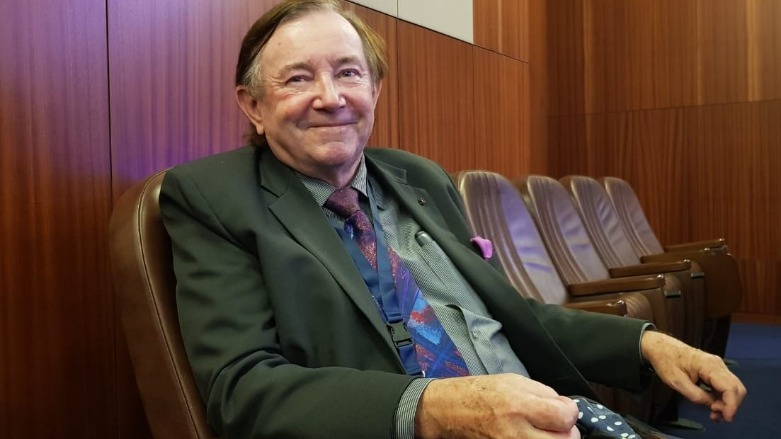Former US climate ambassador says Kurdistan Region has part to play in world environmental efforts

ERBIL (Kurdistan 24) – Ambassador Mark G. Hambley, the former US Special Representative to the UN Commission on Sustainable Development and Special Negotiator on Climate Change, said the Kurdistan Region has a significant role to play in contributing to the fight against climate change.
“Climate is certainly an international issue and it affects every country in every region of the world,” he told Kurdistan 24 on the sidelines of the Middle East Peace and Security Forum hosted by the American University of Kurdistan (AUK) in Duhok last week.
“Kurdistan is a developing country and it should not repeat the same mistakes as other countries,” he said.
Instead of generating electricity using coal plants, he said, the Kurdistan Region can make meaningful strides forward with new green technologies such as solar energy.
“I think the entrepreneurship is evident in the Kurdish Region and it should be mobilized to take advantage of some of these new technologies coming out for solar battery power,” Hambley said. “This would certainly enhance the availability of electricity.”
“It's a God’s given resource we have and I think every house should have a solar panel on it.”
Moreover, he said that the Kurdistan Region should ban the practice of gas flaring, where large amounts of gas is wastefully burned off as it escapes the ground instead of being collected.
In July, the Kurdistan Regional Government (KRG) gave oil companies an 18-month deadline to end gas flaring in efforts to curb environmental pollution, Iraq Oil Report has reported.
The retired US diplomat also said that the Kurdistan Region officials and the general public needs to change their approach to trash disposal and littering.
Many tourist areas and other popular sites throughout the region are littered with plastic because people often simply leave their trash across the breathtaking mountainous views after picnics and other gatherings.
“The littering in this beautiful country is appalling. People should take more responsibility for making this place clean,” he said.
Hambley added that bans on plastics would be helpful in the Kurdistan Region, as they have been in Rwanda, “Or you can recycle such things, and I think the young people should take a lead on this,” he said.
This echoed remarks made by Kurdistan Region Prime Minister Masrour Barzani at the 2021 MERI Forum in late October, who said that a clean environment is the responsibility of citizens and individuals.
“We cannot only rely on some companies to come and collect our waste,” he said. "We should know how to keep our air, land, and water clean and I'm asking all of the citizens of Kurdistan to respect the environment."
He added that the government is working on a program to invite international companies to help the autonomous region with waste management and recycling.
Read More: PM Barzani emphasizes importance of protecting Kurdistan Region environment
Ambassador Hambley said the US had similar issues with litter until President Lyndon Johnson’s wife Lady Bird led an anti-litter campaign, “and people stopped throwing trash out” in the same way.
The younger generations in the Kurdistan Region, he said, should not simply throw out trash and instead take responsibility for Kurdistan.
“It’s a mess, you always should pick it up, there is no reason for that,” Hambley said, adding that there is a strong need for cooperation with Iran and Turkey over their construction of new dams, which affect the water flow into Iraq and the Kurdistan Region.
Read More: Iraq seeks to intensify discussions with Turkey to remedy possible water crisis
“This really impacts water flows to the Kurdish region, and that would be very serious.”
He explained that water, of late, has increasingly become an issue and a tool of conflict, like in Africa, where Egypt and Sudan have publicly decried a massive dam being built in Ethiopia, remarking, “This will cause war if they don't stop that.”
“It’s in everybody’s interest to be cooperative on these issues. Every country has issues with water, Turkey has its own problems that's why they are damming these rivers,” he said, adding that Iran has similar problems with water shortages.
He said the United States had similar issues with Mexico and Canada, but has largely mitigated this through agreements on water-sharing. “I think there are ways it can be resolved,” he said.
Moreover, he said there are ways to conserve water far more effectively in agriculture through new drip irrigation technologies instead of more wasteful practices. “The way they water dirt, which people have done in this region for centuries, is not practical.”
The former US official concluded by saying that universities in the Kurdistan Region could realistically play a key role through scientific research “to make this region an example of stability and focus on climate change.”
